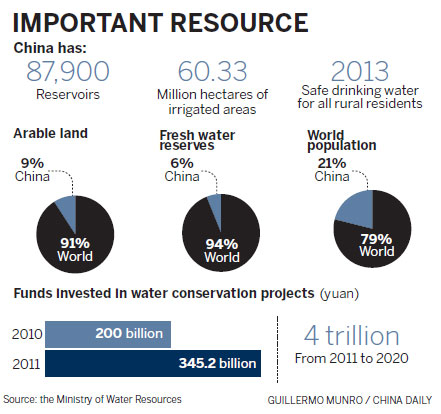World can tap into water management
 0 Comment(s)
0 Comment(s) Print
Print E-mail China Daily, March 9, 2012
E-mail China Daily, March 9, 2012
China is not only committed to working more closely with other nations to find solutions for the global water crisis, but is also willing to share its unique experiences in water management and conservation, said Chen Lei, minister of water resources.
![Chen Lei, minister of water resources, spoke exclusively to China Daily on Wednesday. [China Daily] Chen Lei, minister of water resources, spoke exclusively to China Daily on Wednesday. [China Daily]](http://images.china.cn/attachement/jpg/site1007/20120309/0014222d985010c3a30b0a.jpg) |
|
Chen Lei, minister of water resources, spoke exclusively to China Daily on Wednesday. [China Daily] |
"The water crisis has become a bottleneck for sustainable development across the globe and there needs to be concerted efforts among nations to come up with solutions," Chen said.
Chen, who is leading the Chinese delegation to the 6th World Water Forum in Marseille, France, from March 12-17, says China and the European Union will sign an agreement on sharing experiences on water management.
"Water shortages and water-related disasters are becoming more and more serious, due to rising populations, advanced urbanization and global climate change," Chen said.
The forum, organized by the World Water Council (WWC) every three years, is the main international meeting to discuss water issues.

"The water crisis is a major concern for all nations," Chen said.
The Marseille meeting is the first global platform on water issues that China is participating in as a full member after joining the WWC in 2009.
"As a WWC member, China will join more international exchanges during the forum, especially on disaster control and relief operations," Chen said.
According to the minister, China and Japan will hold a ministerial roundtable during the meeting to discuss solutions to water-related disasters.
Despite the constant threat of flood and drought, China has made remarkable progress in the water sector, Chen said.
The biggest achievement of successful water management has been the record harvests, which have ensured that nearly 95 percent of the grain needs are met from domestic sources, he said.
The national grain output reached 571 million tons in 2011, an annual increase of 4.5 percent and the eighth consecutive year of growth.
Climate change has worsened in recent years and many parts of the globe are facing extreme weather situations. China is no exception as droughts have now become a major threat to grain security.
From 2003 to 2009, the total grain loss from natural disasters was 303.35 million tons - more than four times the increase in output over the same period.
During this period, the grain lost due to drought alone was 185.38 million tons, according to information provided by the Chinese Academy of Agricultural Sciences.
To combat this, China decided to invest 4 trillion yuan ($633 billion) on water conservation projects in the 10 years from 2011. This represents a sharp increase on the 200 billion yuan spent on the water sector in 2010, Chen said.
To ensure that there is adequate funding for water conservation projects, the government will utilize 10 percent of the land transaction revenues for farmland irrigation projects.
China invested a record 345.2 billion yuan on water conservation projects in 2011, gave priority to improving the irrigation infrastructure for grain security and came up with projects to deal with drought and flood, Chen said.
Irrigated land in China reached 60.33 million hectares compared with 49 million hectares in 1980, according to information provided by the Water Ministry. Irrigated land produces more than 75 percent of China's grain output and more than 90 percent of its vegetables and economic crops.
"The government will take steps to further improve water conservancy, such as increasing investment and speeding up construction," Chen said, adding that, "such huge investment is unparalleled anywhere in the world".
More efforts have also been made to improve the water quality and the national flood-control and drought-relief system, the minister said.
The government has set a goal to provide safe drinking water to all rural residents by 2013. As of today, nearly 300 million rural residents lack access to safe drinking water.
Steps to repair 50,000 old and hazardous reservoirs will be undertaken on a priority basis, the minister said. Nearly 7,356 large and medium-sized reservoirs have already been reinforced or rebuilt by the end of 2010. Repairs on another 5,400 small-sized reservoirs will be completed this year.
Besides highlighting China's achievements in the water sector, the minister also revealed that more efforts will be taken to enhance China's involvement in global water movements.
The six-day forum in Marseille is expected to bring together more than 35,000 participants from 180 countries.






Go to Forum >>0 Comment(s)